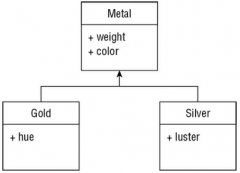- Barajar
ActivarDesactivar
- Alphabetizar
ActivarDesactivar
- Frente Primero
ActivarDesactivar
- Ambos lados
ActivarDesactivar
- Leer
ActivarDesactivar
Leyendo...
Cómo estudiar sus tarjetas
Teclas de Derecha/Izquierda: Navegar entre tarjetas.tecla derechatecla izquierda
Teclas Arriba/Abajo: Colvea la carta entre frente y dorso.tecla abajotecla arriba
Tecla H: Muestra pista (3er lado).tecla h
Tecla N: Lea el texto en voz.tecla n
![]()
Boton play
![]()
Boton play
![]()
3 Cartas en este set
- Frente
- Atrás
|
Chapter 01 - Java Basics
1. Which of the following method signatures is a valid declaration of an entry point in a Java application? A. public void main(String[] args) B. public static void main() C. private static void start(String[] mydata) D. public static final void main(String[] mydata) |
D. An entry point in a Java application consists of a main() method with a single
String[] argument, return type of void, and modifiers public and static. The name of the variable in the input argument does not matter. Option A is missing the static modifier, Option B is missing the String[] argument, and Option C has the wrong access modifier and method name. Only Option D fulfills these requirements. Note that the modifier final is optional and may be added to an entry point method. |

Chapter 01 - Java Basics
2. The following class diagram demonstrates the relationship between Gold and Silver, which extend the Metal class. Assume the attributes are all declared public. Which statement about the diagram is not true? A. The diagram demonstrates platform independence in Java. B. The diagram demonstrates object-oriented design in Java. C. The Gold and Silver classes inherit weight and color attributes from the Metal class. D. Gold does not inherit the luster attribute. |
A. The diagram is an example of object-oriented design in Java, making Option B a
true statement. Options C and D are also true, as they follow from the inheritance model in the diagram. Option A is the correct answer, since platform independence has nothing to do with the diagram. |
|
Chapter 01 - Java Basics
3. What is the proper filename extension for a Java bytecode compiled file? A. .java B. .bytecode C. .class D. .dll |
C. The proper extension for a Java compiled bytecode file is .class, making Option C
the correct answer. |